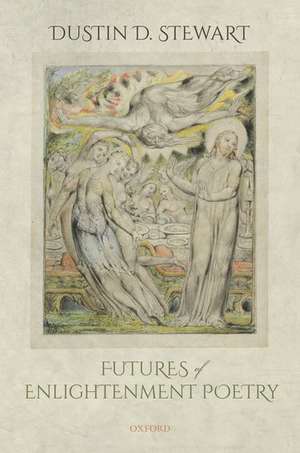Futures of Enlightenment Poetry
Autor Dustin D. Stewarten Limba Engleză Hardback – 29 oct 2020
Preț: 615.17 lei
Preț vechi: 825.90 lei
-26% Nou
Puncte Express: 923
Preț estimativ în valută:
117.71€ • 123.23$ • 97.40£
117.71€ • 123.23$ • 97.40£
Carte tipărită la comandă
Livrare economică 25-31 martie
Preluare comenzi: 021 569.72.76
Specificații
ISBN-13: 9780198857792
ISBN-10: 0198857799
Pagini: 318
Dimensiuni: 161 x 240 x 22 mm
Greutate: 0.64 kg
Editura: OUP OXFORD
Colecția OUP Oxford
Locul publicării:Oxford, United Kingdom
ISBN-10: 0198857799
Pagini: 318
Dimensiuni: 161 x 240 x 22 mm
Greutate: 0.64 kg
Editura: OUP OXFORD
Colecția OUP Oxford
Locul publicării:Oxford, United Kingdom
Recenzii
In working always to connect the past, present, and future through the reciprocal influence of ideas, texts, and beliefs, Stewart takes seriously disembodied poetics as devotional practice.
... Futures of Enlightenment Poetry is an innovative contribution to historical poetics, not least because it puts forward a grounded and persuasive thesis about the complex conditions for a poetics that propels itself into the future.
Stewart's book is a powerful reminder not just about the fecundity of this spiritualist tradition but-even more importantly-that "disembodiment and re-embodiment do seem to need each other and to correct for one another's excess, to belong together if only in their incompatibility.
the book strongly illuminates not only individual poets, some of whom have been insufficiently studied, but also the connections among them. In examining these poets, Stewart displays considerable erudition and sensitivity to literary theory and literary history as well as to the historical context framing the poetry he studies.
Stewart charts an exciting revisionist account of the way poetry negotiates the boundary between spirit and matter. The story he tells of the poets who grapple with the notion of disembodiment and re-embodiment presents a new genealogy of Enlightenment poetry, placing James Thomson, Thomas Gray, Edward Young, William Cowper, Elizabeth Singer Rowe, Mark Akenside, and Anna Letitia Barbauld at the center of a narrative that unfolds from Milton's Paradise Lost to Wordsworth's "Tintern Abbey". Grounding his discussion in detailed accounts of eighteenth-century practice, Stewart presents a reading of Enlightenment poetry that will change the field of historical poetics.
Dustin Stewart's Futures of Enlightenment Poetry begins its argument on its cover...A lithe Christ refuses the tempting banquet and its beckoning revelers, while a bearded Satan floats in the fiery plane above, his look of fear dividing the scene and providing a counterpoint to Christ's determined gaze...He reframes the story of Enlightenment poetry through the cycles of this push and pull, which leave neither spirit nor matter quite the same.
Futures of Enlightenment Poetry proposes rich new ways of exploring the period. Stewart's work is a testament to the relevance of theology and poetry for eighteenth-century studies, and of eighteenth-century studies for humanistic understanding writ large.
... Futures of Enlightenment Poetry is an innovative contribution to historical poetics, not least because it puts forward a grounded and persuasive thesis about the complex conditions for a poetics that propels itself into the future.
Stewart's book is a powerful reminder not just about the fecundity of this spiritualist tradition but-even more importantly-that "disembodiment and re-embodiment do seem to need each other and to correct for one another's excess, to belong together if only in their incompatibility.
the book strongly illuminates not only individual poets, some of whom have been insufficiently studied, but also the connections among them. In examining these poets, Stewart displays considerable erudition and sensitivity to literary theory and literary history as well as to the historical context framing the poetry he studies.
Stewart charts an exciting revisionist account of the way poetry negotiates the boundary between spirit and matter. The story he tells of the poets who grapple with the notion of disembodiment and re-embodiment presents a new genealogy of Enlightenment poetry, placing James Thomson, Thomas Gray, Edward Young, William Cowper, Elizabeth Singer Rowe, Mark Akenside, and Anna Letitia Barbauld at the center of a narrative that unfolds from Milton's Paradise Lost to Wordsworth's "Tintern Abbey". Grounding his discussion in detailed accounts of eighteenth-century practice, Stewart presents a reading of Enlightenment poetry that will change the field of historical poetics.
Dustin Stewart's Futures of Enlightenment Poetry begins its argument on its cover...A lithe Christ refuses the tempting banquet and its beckoning revelers, while a bearded Satan floats in the fiery plane above, his look of fear dividing the scene and providing a counterpoint to Christ's determined gaze...He reframes the story of Enlightenment poetry through the cycles of this push and pull, which leave neither spirit nor matter quite the same.
Futures of Enlightenment Poetry proposes rich new ways of exploring the period. Stewart's work is a testament to the relevance of theology and poetry for eighteenth-century studies, and of eighteenth-century studies for humanistic understanding writ large.
Notă biografică
Dustin D. Stewart is an Assistant Professor of English and comparative literature at Columbia University. He earned his PhD at the University of Texas at Austin and held academic posts in Atlanta and Colorado Springs before moving to New York City. Futures of Enlightenment Poetry is his first book.
